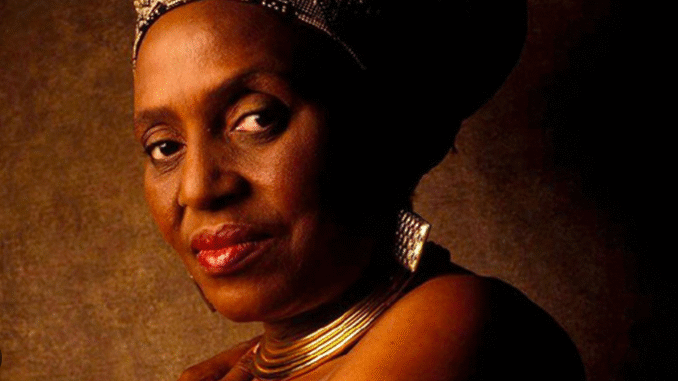
Miriam Makeba: Mama Africa and Voice of African Music. Miriam Makeba was a South African singer, songwriter, and activist. She was known worldwide as Mama Africa. Her music blended African rhythms, South African jazz, and Afrobeat influences. Her voice was warm, clear, and powerful.
She was more than a singer. She was a voice of freedom and African pride. Her songs spoke to millions.
Early Life
Miriam Makeba was born in 1932 in Johannesburg, South Africa. Her childhood was difficult. Her mother worked as a domestic worker and sang in church. Her father died early.
She grew up under apartheid, a system of racial segregation. That shaped her life and music. She started singing in school and church. Later she joined local groups performing in townships.
Musical Beginnings
In the 1950s, she joined The Manhattan Brothers, a South African vocal group. Later, she co-founded The Skylarks, a female vocal group mixing African folk and jazz.
Her first big international hit was “Pata Pata.” The song became one of the most popular Miriam Makeba songs globally. Her music combined African traditions with South African jazz and joyful rhythms.
Exile and Global Career
In 1959, she acted in the film Come Back, Africa, critical of apartheid. The South African government banned her from returning. She lived in exile for over 30 years.
She moved to the United States. She performed at major stages and collaborated with world artists.
In 1962, she sang at President John F. Kennedy’s birthday party. In 1963, she spoke at the United Nations against apartheid. Her music and activism became one.
Major Albums
- Miriam Makeba (1960) – Her solo debut, introducing African jazz vocals.
- The World of Miriam Makeba (1963) – Songs in multiple African languages.
- An Evening with Belafonte/Makeba (1965) – Collaboration with Harry Belafonte, won a Grammy.
- Pata Pata (1967) – Included her signature hit for global audiences.
- Sangoma (1988) – Traditional African songs, spiritual and personal.
- Homeland (2000) – Later album celebrating African pride and freedom.
Pata Pata (1967)
Pata Pata became her global signature song. The rhythm was light and infectious. The song spread African music worldwide.
An Evening with Belafonte/Makeba (1965)
The collaboration highlighted African jazz and protest songs. It earned her international recognition and a Grammy award.
Sangoma (1988)
Sangoma reflected her roots. She recorded songs learned from her mother and traditional healers.
The album was calm, spiritual, and full of African warmth.
What Made Her Different
- Sang in many African languages.
- Stayed true to South African jazz and African rhythms.
- Mixed music and activism naturally.
- Lived in exile but never lost her African identity.
- She showed the world that African music can be powerful and global.
She didn’t follow Western trends. She followed African traditions.
Who Listens to Her
- Fans of African music and South African jazz.
- Global world music listeners.
- Activists seeking songs with meaning.
- People looking for calm and reflective music.
Her music appeals to both entertainment seekers and those wanting African cultural depth.
Collaborations
Miriam Makeba worked with:
- Harry Belafonte – Global stage performances.
- Hugh Masekela – South African jazz trumpeter, also her husband briefly.
- Paul Simon – Part of the Graceland tour in the 1980s.
- Nina Simone – Mutual respect for music and activism.
Her collaborations kept African sounds central, while reaching wider audiences.
Activism
She spoke at the UN and major global stages. She opposed apartheid and corruption. She was banned from South Africa and lived in exile. Her music was a tool for freedom and African pride.
She proved that music can carry a message.
Return to South Africa
After apartheid, she returned in the 1990s. Fans welcomed her with love and respect. She performed live again in South Africa after decades. Her return symbolized freedom and African resilience.
Later Years and Legacy
Miriam Makeba continued performing worldwide into her later years. She received many awards for her music and activism. She died in 2008 at age 76 after collapsing on stage in Italy.
Her legacy lives on:
- Global recognition as Mama Africa.
- Pioneer of South African jazz and African music worldwide.
- Symbol of courage, freedom, and cultural pride.
Words
Miriam Makeba was more than a singer. She was a world music legend. Her songs carried Africa to the world. She combined rhythm, jazz, and activism.
Her life showed that music can change hearts. Soft in sound. Strong in message. If you want to feel African pride, depth, and history—Miriam Makeba is essential listening.
Leave a Reply